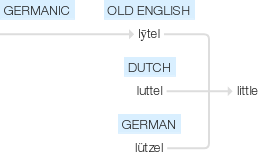Little
Old English lȳtel, of Germanic origin; related to Dutch luttel, German dialect lützel .
wiktionary
From Middle English litel, from Old English lȳtel, from Proto-West Germanic *lūtil, from Proto-Germanic *lūtilaz(“tending to stoop, crouched, little”), from Proto-Indo-European *lewd-(“to bend, bent, small”), equivalent to lout + -le. Cognate with Dutch luttel, regional German lütt and lützel, West Frisian lyts, Low German lütt, Old High German luzzil, Middle High German lützel, Old English lūtan(“to bow, bend low”); and perhaps to Old English lytig(“deceitful, lot deceit”), Gothic 𐌻𐌹𐌿𐍄𐍃( liuts, “deceitful”), 𐌻𐌿𐍄𐌾𐌰𐌽( lutjan, “to deceive”); compare also Icelandic lítill(“little”), Swedish liten, Danish liden, lille, Gothic 𐌻𐌴𐌹𐍄𐌹𐌻𐍃( leitils), which appear to have a different root vowel. More at lout.
etymonline
little (adj.)
Old English lytel "not large, not much, small in size or number; short in distance or time; unimportant,"
from Proto-Germanic *lutilla- (source also of Old Saxon luttil, Dutch luttel, Old High German luzzil, German lützel "little"), perhaps originally a diminutive of the root of Old English lyt "little, few," from PIE *leud- "small."
"Often synonymous with small, but capable of emotional implications which small is not" [OED]. Now with less, least, but formerly and in dialect littler, littlest. In terms of endearment from 1560s. Meaning "younger" (of a brother, sister, etc.) is from 1610s. As an adverb, Old English lytel.
Little while "a short time" is from 12c. Phrase the little woman "wife" attested from 1795. Little people "the faeries" is from 1726; as "children" it is attested from 1752; as "ordinary people" (opposed to the great) from 1827. Little death "orgasm" (1932) translates French petite mort. Little Neck clams (1884) are so called for Little Neck, a "neck" of land on Long Island's North Shore, where they first came into favor. Little green men "space aliens" is from 1950. Little boys' room (or girls') as a euphemism for "lavatory" is from 1957. Little breeches for "boy" is by 1785. Little black dress is from 1939.
At the beginning of summer, smart women who stay in town like to wear sheer "little black dresses." Because most "little black dresses" look alike, retailers struggle each year to find something which will make them seem new. [Life magazine, June 13, 1939]
little (v.)
Old English lytlian "to lessen, decrease, become little or less, diminish; shorten; fall out of use; belittle," from root of little (adj.).
little (n.)
late Old English, "small piece, small quantity or amount; a short time; unimportant persons," from little (adj.). Little by little is from late 15c. (litylle be litille). Old English also had lytling "little one, infant child; unimportant person."
